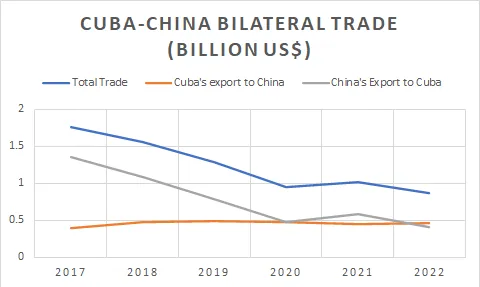Cuba and China, two prominent nations with rich histories and unique ideological backgrounds, have maintained a long-standing diplomatic relationship. Over the years, their bilateral cooperation has evolved, leading to mutually beneficial partnerships in various sectors. This article delves into the key aspects of China-Cuba relations, highlighting the historical background, economic ties, cultural exchanges, and prospects for future cooperation.
Historical Background of Cuba-China Relations
China and Cuba share common ideological roots, with both countries embracing socialism as their guiding principle. The revolutionary movements in both nations, led by Fidel Castro in Cuba and Mao Zedong in China, further cemented their historical connection and laid the foundation for diplomatic ties.
China and Cuba established formal diplomatic relations in 1960, shortly after the Cuban Revolution. Throughout the Cold War era, China provided political and economic support to Cuba, acting as a key ally against Western influence. This alliance endured even after the collapse of the Soviet Union, as China became an important economic partner for Cuba.
Economic Cooperation
China-Cuba Trade Relations
China has become Cuba’s largest trading partner in recent years. Bilateral trade between the two countries has steadily grown, encompassing a diverse range of sectors such as agriculture, telecommunications, energy, and biotechnology. China’s imports from Cuba primarily consist of nickel, tobacco, and seafood, while China exports machinery, electronics, and consumer goods to Cuba.
In April 2023, China exported $37.4M to Cuba and imported $57.2M. The trade imbalance was -$19.9M. From April 2022 to April 2023, China’s exports to Cuba rose by $5.85M (18.6%) from $31.5M to $37.4M. During the same period imports from Cuba increased by $2.82M (5.17%) from $54.4M to $57.2M.
Investment and Development
China has been an active investor in Cuba, particularly in infrastructure projects and manufacturing sectors. Chinese companies have contributed to the development of the Mariel Special Economic Development Zone, which serves as a hub for foreign investment in Cuba. Additionally, China has provided loans and assistance for various development projects, including renewable energy initiatives and transportation infrastructure.
China-Cuba Energy Cooperation
China and Cuba have a longstanding collaboration in energy projects. Chinese companies, such as Great Wall Drilling, have been investing in Cuba’s energy industry since 2005, playing a vital role in drilling oil wells. Cuba aims to enhance its energy security by increasing the proportion of renewable energy in its consumption, targeting 24 percent by 2030. China and Chinese companies are expected to contribute significantly to Cuba’s energy transition, with ongoing renewable projects. The Mariel Solar project, a joint venture between Shanghai Electric’s subsidiary and UK-based Hive Energy, commenced construction in 2019. This 62MW solar park in the Mariel Special Development Zone began generating power in 2021.
Educational and Cultural Collaboration between Cuba and China
China and Cuba have fostered educational exchanges, with scholarships provided to Cuban students to study in China. Additionally, cultural events, such as film festivals, art exhibitions, and music performances, have helped strengthen cultural ties between the two nations. These exchanges promote mutual understanding and people-to-people connections, enhancing cultural diplomacy.
Havana’s China Town, Barrio Chino
Havana’s Chinatown, known as Barrio Chino, is a culturally significant neighborhood in the Cuban capital. It has a rich history since the 19th century, showcasing the enduring influence of Chinese immigrants in Cuba. Established in the mid-1800s, Chinese laborers migrated to Cuba for sugarcane and other industries, bringing their traditions, language, and culinary heritage. This shaped the distinct cultural identity of Havana’s Chinese community.
Medical Cooperation
China has been actively involved in supporting Cuba’s healthcare system. Through medical collaborations and personnel exchanges, China has assisted Cuba in areas such as medical research, pharmaceuticals, and the training of healthcare professionals. This cooperation has played a crucial role in Cuba’s healthcare development and response to global health challenges.
Chinese Spy Facilities in Cuba
On June 10, 2023, the Biden administration accuses China of setting up eavesdropping posts in Cuba. The Wall Street Journal reported a “secret agreement” between China and Cuba for an eavesdropping station. The alleged purpose was to monitor American communications, including military bases and ship traffic. However, both China and Cuba denied the existence of such facilities in Cuba.
Future Prospects of China-Cuba Relations
China’s Belt and Road Initiative (BRI) presents opportunities for further boosting Cuba-China relations. As Cuba aims to attract foreign investment and modernize its infrastructure, Chinese investments and expertise could play a pivotal role. Collaboration in emerging sectors, including renewable energy and biotechnology, holds significant potential for both countries.
China and Cuba continue to maintain strong political ties, supporting each other on international platforms and in multilateral organizations. Regular high-level visits and exchanges between officials from both nations serve to deepen understanding and enhance cooperation on global issues such as climate change, trade, and regional stability.
Summary of Cuba-China Relations
Cuba-China relations have evolved into a multifaceted partnership characterized by economic cooperation, cultural exchanges, and shared political interests. As both countries prioritize development and stability, their collaboration is poised to expand further in the future. With China’s growing global influence and Cuba’s strategic location in the Caribbean, the relationship between these two nations is likely to remain a significant aspect of their respective foreign policies.








